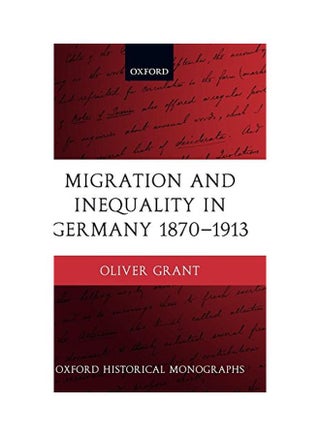استرجاع مجاني وسهل
أفضل العروض



| الناشر | Oxford University Press |
| تنسيق الكتاب | غلاف صلب |
| وصف الكتاب | Migration and Inequality in Germany 1870-1913 presents a new view of German history in the late nineteenth century. Dr Grant argues that many of the problems of Imperial Germany were temporary ones produced by the strain of rapid industrialisation. Drawing on the tools of development economics he argues that Germany passed through a labour surplus phase as desribed by the Lewis Model. This period came to an end around 1900, creating more favourable conditions for political reform and social reconciliation. But Germany's progress to full political and economic maturity was derailed at the outbreak of war in 1914. Dr Grant bases his argument on an analysis of the economic and demographic forces driving migration in nineteenth-century Germany. High rural-urban migration led to the rapid expansion of German cities. The main factors driving this were social and economic change in the countryside and the process of the demographic transition. The release of surplus labour onto urban labour markets held back wage increases and led to an increase in inequality. The German economy behaved in a way which seemed to bear out the predictions of Karl Marx and this contributed to the appeal of Marxist ideas and the rise of the social democratic vote. However, this was a temporary phase. The labour surplus period was largely over by 1900. The rise in inequality which had begun in the 1820s came to an end, and inequality began to fall. Contrary to received wisdom, Germany was not on the brink of a general socio-economic crisis in 1914; instead it was moving away from one. However, the political system failed to take advantage of this opportunity, and Germany's dependence on imported food and raw materials led to a strategic crisis which combined disastrously with internal political problems. |
| تاريخ النشر | 08 Dec 2005 |
| رقم الكتاب المعياري الدولي 13 | 9780199276561 |
| اللغة | الإنجليزية |
| المراجعة التحريرية | Grant's highly empirical study is undoubtedly convincing and makes an immensely profitable read. In many respects it provides new insights into Imperial Germany, a topic which has already been intensely researched. * German Historical Institute Bulletin * [An] impressive work. * Economic History * Migration and Inequality offers an uncommonly sophisticated and lucid econometric analysis, important in reopening the virtually dormant debate on the relative 'peculiarity' of Imperial Germany's sociopolitical development. * Eric Kurlander, Central European History |
| عدد الصفحات | 416 |

